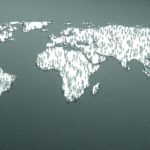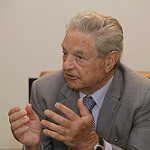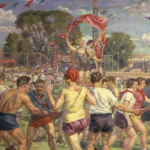According to the media, our continent is beset with problems caused by the euro, Italian banks, the future of the European Union, Brexit, the rise of right-wing parties and the imminent threat of Russian invasion of the Baltic states or Poland. These are but petty or make-believe problems or, to put it in plain English, these are just narratives that the European establishment is using to explain its inability to avert the impending disaster and disintegration of the multi-ethnic societies.
The European governments relinquished their control over their borders and their monetary policy to Brussels (i.e. renounced sovereignty), which is run by unelected civil servants, so now they are not able to act. Neo-liberal privatization of such facilities as electricity companies, highways and railroads whose operation is often outsourced to foreign companies serving other interests than those of the European people exacerbates the lack of governance in Europe..
The EU establishment believes that the free markets and regulations will solve Europe’s energy problems. The transition to renewables is far from sufficient to replace traditional energy resources in the foreseeable future. Russia remains the largest energy provider as it satisfies 30% of Europe’s oil, 30% of Europe’s coal, and 40% of Europe’s gas demand.
Turkey is indispensable to Europeans if they want to be connected to alternative gas fields in the East, so they cannot afford to have hostile relations with the Ottomans in Ankara and the Tsars in Moscow. Yet, we know from history that the Europeans have always feared more their fellow Christians in Moscow than the Muslims from the Middle East. For some unknown reason they rather like to subjugate themselves to Islamists than have cordial relations with the Russian, even if dictatorial, rulers.
The European population is in decline, its fertility is 1.5. Every next generation will be 25% smaller. Judging by the numbers, it is clear that in the long run Europeans will cease to exist. With shrinking energy resources, a reduced European population (in 1950 it numbered 446 million) would not be a bad idea if it were not for Africa’s skyrocketing population growth and the fact that many Africans are relocating to Europe, giving up on their otherwise fertile continent which is rich in resources. While there is a lot of discussion about immigration, NGO’s are smuggling Africans into Europe on an industrial scale with the European establishment’s assent. Europe is on its way to start the biggest (apart from the Bolshevik one in Russia) social-engineering experiment in history, labelled by some as the “grand replacement”.
In Gefira #13 we discuss the future of Europe’s demographics and energy resources. We also focus our attention on big data. As the Internet and information technology is becoming more important than television, power struggle will not be limited to the real world, and since profiling, manipulation and hacking, cyberwar, cyber espionage and cyber subversion are part and parcel of today’s Machiavellian scheming, our Gefira team will cover it all in relation to a long-term investment perspective. Subscribe or Download




















